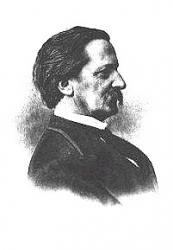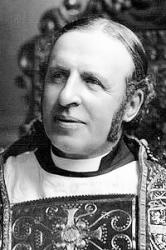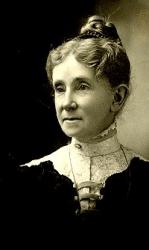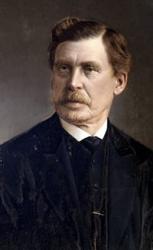Planning worship?
Check out our sister site, ZeteoSearch.org,
for 20+ additional resources related to your search.
- |
User Links
Person Results
‹ Return to hymnal








Export as CSV
Josiah G. Holland

1819 - 1881 Hymnal Number: 98 Author of "There's a song in the air, there's a star in the sky" in The Methodist Hymnal, Official Hymnal of the Methodist Episcopal Church, Methodist Episcopal Church South, Methodist Protestant Church Holland, Josiah Gilbert, was born at Belchertown, Massachusetts, July 24, 1819. He was for some time on the staff of the Springfield Republican, and became in 1870 the editor of Scribner's Magazine. He has written several successful books, and some poetical pieces. One of the latter, "For summer's bloom, and autumn's blight" (Praise in and through all things), was included, from Bitter Sweet, 1858, in the Boston Unitarian Hymn [and Tune] Book for the Church & Home, 1868. He died Oct. 12, 1881.
--John Julian, Dictionary of Hymnology (1907)
===============
Holland, J. G. , p. 529, ii. His Christmas Carol, “There's a star in the sky," from The Marble Prophecy and other Poems, 1872, is included in the American Methodist Hymnal, 1905. He died Oct. 12, 1881. [Rev. L. F. Benson, D.D.]
--John Julian, Dictionary of Hymnology, New Supplement (1907)
Josiah G. Holland
H. C. G. Moule

1841 - 1920 Person Name: Handley Carr Glyn Moule Hymnal Number: 560 Author of "Lord and Savior, true and kind" in The Methodist Hymnal, Official Hymnal of the Methodist Episcopal Church, Methodist Episcopal Church South, Methodist Protestant Church Moule, Handley Carr Glyn, M.A., son of the Rev. H. Moule, was born at Fordington, Dec. 23, 1841, and educated at home and at Trinity College, Cambridge, B.A. in first class Classical and Theological honours, 1864-65. He was Carus Prizeman, 1862; Browne's Medallist, 1863; and gained the Seatonian Prize, 1869-73 and 1876. Taking Holy Orders in 1867, he was curate of Fordington, Dorset, 1867-73, and 1877-80; Dean, Trinity College, Cambridge, 1874-77; and Principal of Ridley Hall, Cambridge, 1880. He was Fellow of his College, 1865; Select Preacher at Cambridge, 1880-81, 87; and Chaplain to the Bishop of Liverpool, 1880. His works include:—
(1) The Seatonian Prize Poems as above; (2) Poems on the Acts of the Apostles, 1869; (3) Sermons on the Litany, 1870; Dorchester Poems, 1878; (4) Commentaries on the Epistles to the Romans, Ephesians, and Philippians, in the Cambridge Bible for Schools, 1880-89; (5) Christianus and Other Poems 1883; (6) Thoughts on Christian Sanctity, 1885 (with hymns appended); (7) On Union with Christ, 1885 (with hymns appended); On Spiritual Life, 1887 (with hymns appended) ; and others. Mr. Moule was also a contributor to Smith's Dictionary of Christian Biography.
Of Mr. Moule's hymns the following appeared in the Appendix to the Fordington Hymn Book, 1878:—
1. Chief Shepherd of Thy people. Missions.
2. Jesus, such His love and power. A present Saviour.
3. Lift heart and voice above. Christmas.
In the same Appendix there is a paraphrase of the Benedicite in metre, "Bless the Lord of glory," by H. M. Moule, M.A., of Queen's College, Cambridge, his brother.
--John Julian, Dictionary of Hymnology (1907)
================
Moule, Handley C. G., p. 771, ii. In 1899 Dr. Moule resigned his post at Ridley Hall, and became.Norrisian Professor of Divinity at Cambridge. In 1901 he was consecrated as Bishop of Durham. The following additional hymns by Bp. Moule have come into common use:—
1. Come in, O come! the door stands open now. [Seeking after Holiness.] Appeared in the 2nd ed. of Hymns of Consecration and Faith, 1890; and in the author's Songs in the House of the Pilgrimage, 1896.
2. Dear is Thy Presence with Thy friends. [Communion of Saints.] Included in Hymns of Consecration and Faith, 1890.
3. Lord and Saviour, true and kind. [Jesus the Guide of Youth.] Appeared in The Council School Hymn Book, Novello, 1905.
4. Lord, is it I that enter here. [Victory over sin.] First published in the author's Christian's Victory over Sin, 1888.
5. My glorious Victor, Prince Divine. [Consecration of Self to God.] Appeared in the 2nd edition of Hymns of Consecration and Faith, 1890; and again in the author's Songs in the House of the Pilgrimage, 1896.
6. Raise the song, ye loyal voices. [King's Coronation.] Written for Novello's Ten National Hymns and Tunes for children's use on the occasion of the Coronation of King Edward VII., 1902.
7. They watched Him up the silent skies. [Ascension.] Written for Dodderidge's Hymns for Church & Home, 1904.
Additional publications by Bp. Moule which include hymns are Songs in the House of the Pilgrimage, 1896; The Christian's Victory over Sin, 1888. Poems on the Acts of the Apostles, &c, 1869; Christianus and other Poems, 1883; At the Holy Communion, 1892; Thoughts on Union with Christ, 1886.
--John Julian, Dictionary of Hymnology, New Supplement (1907)
H. C. G. Moule
Johann C. Schwedler
1672 - 1730 Hymnal Number: 147 Author of "Ask ye [me] what great thing I know" in The Methodist Hymnal, Official Hymnal of the Methodist Episcopal Church, Methodist Episcopal Church South, Methodist Protestant Church Schwedler, Johann Christoph, son of Anton Schwedler, farmer and rural magistrate at Krobsdorf, near Lowenberg, in Silesia, was born at Krobsdorf, Dec. 21, 1672, and matriculated at the University of Leipzig, in 1695 (M.A. 1697). In 1698 he was appointed assistant minister at Niederwiese, near Greiffenberg, and began his duties there on the 18th Sunday after Trinity. On the death of the diaconus, Christoph Adolph, he succeeded him as diaconus, in December, 1698; and, finally, in 1701, he became pastor there. He died at Niederwiese, suddenly, during the night of Jan. 12, 1730.
Schwedler was a powerful and popular preacher, and peculiarly gifted in prayer. It is said that sometimes, beginning service at 5 or 6 a.m., he would continue the service to relays who in succession filled the church, till 2 or 3 p.m. He also founded an orphanage at Niederwiese. He was a near neighbour and great friend of Johann Mentzer and N. L. von Zinzendorf. As a hymnwriter he was useful and popular. The principal theme of his hymns was the Grace of God through Christ, and the joyful confidence imparted to the soul that experienced it. Of his hymns, 462 appeared in his Die Lieder Mose und des Lammes, oder neu eingerichtetes Gesang-Buch, Budissin, 1720, Nos. 345-806. Others are in his Wöchentliche Hauss-Andacht, 1112, in his various devotional works, and in the hymn-books of the period.
The only hymn by Schwedler translated into English is:—
Wollt ihr wissen was mein Preis? Jesus the Crucified, or Love to Christ. Founded on 1 Cor. ii. 2, and Gal. vi. 14. The trs. in common use are:—
1. Ask ye what great thing I know. By Dr. Kennedy, in his Hymnologia Christiana, 1863, No. 620, being a good tr. of st. i.-v., with a sixth stanza suggested by st. vi. of the German.
2. Do you ask what most I prize? This is a fairly close version, omitting st. vi., as No. 98, in the Moravian Hymn Book, 1886. [Rev. James Mearns, M.A.]
--Excerpts from John Julian, Dictionary of Hymnology (1907)
Johann C. Schwedler
Emily Huntington Miller

1833 - 1913 Hymnal Number: 445 Author of "Tell the blessed tidings" in The Methodist Hymnal, Official Hymnal of the Methodist Episcopal Church, Methodist Episcopal Church South, Methodist Protestant Church Miller, Emily, née Huntingdon, daughter of the Rev. Thomas Huntington, D.D., was born at Brooklyn, Connecticut, Oct. 22, 1833: and was subsequently married to Professor Miller. Mrs. Miller is joint editor of The Little Corporal, published at Chicago, in which several of her poetical pieces appeared. Of her hymns the most widely known are:—
1. Enter Thy temple, glorious King. Opening of a Place of Worship. This was written for the opening of the Methodist Episcopal Church, at Akron, Ohio, 1861; and is in several collections, including the Methodist Episcopal Hymnal, 1878.
2. I love to hear the story. Early Piety. Written for and published in The Little Corporal, 1867. This is in extensive use in Great Britain and America. It was included in Hymns Ancient & Modern, in 1875.
3. Beyond the dark river of death. Heaven.
4. Blessed are the children. Early Piety.
5. Father, while the shadows fall. Evening.
6. Hark, the chorus swelling. Christmas.
7. I love the name of Jesus. Holy Name Jesus.
8. Jesus bids us shine. Early Piety.
9. Stay, trembling soul, and do not fear. Holy Communion.
10. Work and never weary, though thy strength be small. Perseverance.
Of these hymns, No. 7 is in the 1878 Additional Hymns to the Leeds Sunday School Hymn Book; No. 8, is in Barrett's Book of Praise for Children, 1881; No. 9, in Common Praise, 1879; and Nos. 4, 5, 6, and 10, in E. Hodder's New Sunday School Hymn Book, 2nd ed., 1868.
--John Julian, Dictionary of Hymnology, Appendix, Part II (1907)
=======================
Miller, Emily, née Huntington, p. 1579, ii. Of Mrs. Miller's hymns, Nos. 4, 5, 6 and 10 were written for and first printed in The Little Corporal, as follows: 4—April, 1868; 5—Aug. 1868; 6—May, 1868; and 10—Sept. 1868. Nos. 7, 8, and 9 are not hers. No. 8, "Jesus bids us shine," she informs us is by Susan Warner. [Rev. James Mearns, M.A.]
--John Julian, Dictionary of Hymnology, New Supplement (1907)
Emily Huntington Miller
Marianne Farningham

1834 - 1909 Hymnal Number: 365 Author of "We hope in thee, O God" in The Methodist Hymnal, Official Hymnal of the Methodist Episcopal Church, Methodist Episcopal Church South, Methodist Protestant Church Pseudonym, real name Marianne Hearn.
===========================================
Hearn, Marianne, known to the public only by her nom deplume of Marianne Farningham, was born at Farningham, in Kent, Dec. 17, 1834. She resided for short periods at Bristol and Gravesend, and since 1865 at Northampton. Miss Farningham is a member of the Baptist denomination. Her literary work has been done chiefly in connection with the Christian World newspaper, on the staff of which she has been from its first publication. She is also editor of the Sunday School Times. Most of her contributions to the Christian World have been republished in book form, and include:—
(1) Lays and Lyrics of the Blessed Life, 1861. (2) Poems, 1865. (3) Morning and Evening Hymns for the Week, 1870. (4) Songs of Sunshine, 1878.
From these works the following hymns have passed into common use:—
1. Father Who givest us now the New Year. Old and New Year. From her Songs of Sunshine, 1878.
2. Hail the children's festal day. Sunday School Anniversaries. Appeared in the Sunday School Times, 1875.
3. Let the children come, Christ said. Christ's invitation of children. In G. Barrett's Book of Praise for Children, 1881. It was written in 1877.
4. When mysterious whispers are floating about. Death anticipated. Appeared in the Christian World, in the Autumn of 1864; and again in her work, Poems, 1865. In I. D. Sankey's Sacred Songs & Solos, it is entitled "Waiting and Watching for me" (the refrain of each stanza), and is altered to "When my final farewell lo the world I have said." This is the most popular of Miss Hearn's hymns. [Rev. W. R. Stevenson, M.A.]
-- John Julian, Dictionary of Hymnology
===============
Hearn, Marianne [Farningham], pp. 502, ii.; 1587, ii. Miss Hearn published in 1903 Harvest Gleanings and Gathered Fragments. Other hymns by her in common use include:—
1. Anywhere with Jesus. [Follow Christ] In her Lays and Lyrics, 1860, p. 163.
2. Christ, we children sing to Thee. [Praise to Jesus.] Written for C. Bonners Garland of New Sunday School Music, 1881 (1886, No. 2).
3. He smiled as He stretched out Hit hand in glad welcome. [God's Call.] In the Baptist Junior Hymnal, 1906, No. 175.
4. Just as I am, Thine own to be. [Follow Christ.] Contributed to the Voice of Praise, 1887, No. 348. Suggested by Miss Elliott's better-known hymn.
5. Little feet are passing. [The Way to Heaven.] In her Poems, 1866, p. 271.
6. Sing, for the world rejoiceth. [Spring.] Contributed to the Voice of Praise, 1887, No. 470.
We may note that "Father! abide with us," p. 365, ii., is by her, from Lays and Lyrics, 1860, p. 143. [Rev. James Mearns, M.A.]
--John Julian, Dictionary of Hymnology (1907)
Marianne Farningham
Bernard Barton

1784 - 1849 Hymnal Number: 378 Author of "Walk in the light, so shalt thou [and you shall] know" in The Methodist Hymnal, Official Hymnal of the Methodist Episcopal Church, Methodist Episcopal Church South, Methodist Protestant Church Barton, Bernard, commonly known as the "Quaker Poet," was born in London Jan. 31, 1784, and educated at a Quaker school at Ipswich. In 1798 he was apprenticed to Mr. S. Jesup, a shopkeeper at Halstead, Essex, with whom he remained until 1806, when he removed to Woodbridge, Suffolk, and entered into business with his brother, as a coal and corn merchant. On the death of his wife at the end of the first year of their married life, he proceeded to Liverpool, where he acted as a private tutor for a short time. He returned to Woodbridge in 1810, where he secured an engagement in the local bank of the Messrs. Alexander. This appointment he held for 40 years. He died at Woodbridge, Feb. 19, 1849. During the same year his daughter published his Poems and Letters, with a Memoir. His poetical works were numerous, including:—
(1) Metrical Effusions , 1812; (2) Poems by an Amateur, 1818; (3) Poems , 1820; (4) Napoleon, and other Poems, 1822; (5) Poetic Vigils, 1824; (6) Devotional Verses founded on Select Texts of Scripture, 1826; (7) A Widow's Tale, 1S27; (8) New Year's Eve, 1829; (9) The Reliquary, 1836; (10) Household Verses, 1845. A complete list of his works is given in Joseph Smith's Descriptive Catalogue of Friends' Books, Lond., J. Smith, 1867, vol. i. pp. 196-200.
From these works about 20 pieces have come into common use as hymns. These are found principally in the Scottish Evangelical Union Hymnal, on the one hand, and various American Unitarian collections on the other. The best known are, “Lamp of our feet, whereby we trace," and "Walk in the light, so shalt thou know." From his Devotional Poems, &c, 1826, the following have passed into the Scottish Evangelical Union Hymnal, 1878:—
1. Fear not, Zion's sons and daughters. Gracious Promises. This is part of a poem on Isaiah xliii. 1, “Fear not, Jacob, tabulated."
2. Hath the invitation ended? Invitation.
3. See we not beyond the portal? Present vision Imperfect. This is part of the poem on 1 Cor. xiii. 12, “Dim and dark our present vision."
4. Those who live in love shall know. Peace.
5. Would'st thou share this benediction! Poor in Spirit.
In addition, there are also in various collections:—
6. Around Bethesda's healing wave. Consolation. This is on pp. 182-185, in his Napoleon, and other Poems, 1822, in 10 stanzas of 6 lines. A cento therefrom is given in a few American hymnals, including Mr. Beecher's Plymouth Collection, No. 746, as, "The waters of Bethesda's pool."
7. There is a life more dear. Spiritual Life. From the Devotional Verses, 1826, p. 96, into Kennedy, 1863, No. 1177, with the omission of stanza v.
8. Say not the law divine. Spiritual Law. Also from the Devotional Verses, 1826, p. 34, into various American hymnals, generally Unitarian, as the Hymn and Tune Book, Boston, 1868, No. 342, &c, where, however, it is rewritten from an irregular metre to S.M. This had previously appeared in Hedge and Huntington's Hymns for the Church of Christ, Boston, U.S., 1853.
Other hymns, given in great part in American Unitarian collections, are annotated under their respective first lines.
-- John Julian, Dictionary of Hymnology (1907)
======================
Barton, Bernard, p. 116, i. Other hymns in common use:—
1. God made the country, yet in scenes. Country Life. This begins with stanza iii. of a poem "Addressed to a Friend in London" in The Reliquary, 1836, p. 83.
2. Lamp of our feet! whereby we trace. Holy Scriptures, published in The Reliquary, 1836, p. 116, in 11 stanzas of 4 lines. It is in common use in its full form, and also abbreviated as (1) "Word of the ever-living God"; and (2) "Word of the everlasting God." In extensive use.
3. There is a Friend more tender, true. Jesus, the Friend. This begins with stanza iii. of "But yet, however cheerless seem," in his Poems & Letters, 1853, p. 254.
4. Walk in the light! So shalt thou know. (Walking in the Light.) Published in his Devotional Verses, 1826, p. 242, in 6 stanzas of 4 lines. It is found in many modern collections, and is one of the most popular of his hymns.
5. We journey through a vale of tears. Heaven Anticipated. In his Poems & Letters, 1853, p. 193.
Of these hymns, Nos. 3, 5, are of an earlier date than the Poems & Letters of 1853; but we have failed to find them in Barton's earlier works.
--John Julian, Dictionary of Hymnology, Appendix, Part II (1907)
Bernard Barton
Edwin Pond Parker

1836 - 1920 Person Name: Edwin P. Parker Hymnal Number: 295 Author of "Lord, as we thy name profess [address]" in The Methodist Hymnal, Official Hymnal of the Methodist Episcopal Church, Methodist Episcopal Church South, Methodist Protestant Church Parker, Edwin Pond, D.D., born at Castine, Maine, Jan. 13, 1836, and educated at Bowdoin College, Maine, and Bangor Theo. Sem., Maine. Entering the Congregational ministry, he became pastor of the Second Church of Christ, Hartford, Conn., Jan. 1860, and has remained there to the present date. Besides editing some Sunday School Hymn and Tune Books, now out of use, he was chief Editor of The Book of Praise . . . (Congregational) . . ., Phila., 1874; and Editor of The Christian Hymnal, Hartford, Conn., 1877, revised ed. 1889. His hymns in common use include:—
1. Blest are they in Christ departed. [Death and Burial.] Dated 1886. In the Christian Hymnal, 1889, and several other collections.
2. Come to Jesus, ye who labour. [Invitation.] Written in 1898, and included in The Pilgrim Hymnal , 1904.
3. Hail, Holy Light, the world rejoices. [Morning.] Dated 1889, and given in The Christian Hymnal, 1889, The Pilgrim Hymnal, 1904, and others.
4. I would tell Jesus. [The Soul's Desire.] Written in 1887, and included in The Christian Hymnal, 1889.
5. Lord, as we Thy Name profess. [Sincerity.] Dated 1889, first published in The Christian Hymnal, 1889, and subsequently in several other collections, including The Pilgrim Hymnal, 1904.
6. Master, no offering costly and sweet. [Love and Service.] Originally written in 1888, to close a sermon, and first published in The Christian Hymnal, 1889, together with music by the author. It has been adopted, together with the original music, by many compilers. For both words and music see The Pilgrim Hymnal, 1904.
7. O Master, Brother, Lord, and Friend. [Christmas.] Written to close a Christmas sermon, 1903; first printed in a local newspaper, and then included in The Pilgrim Hymnal, 1904.
8. Thy Name, O Lord, in sweet accord. [Divine Worship.] First published in The Christian Hymnal, 1889, and subsequently in several collections, including The Pilgrim Hymnal, 1904.
Dr. Parker received his D.D. from Yale University, and is at the present time (1906) Chaplain to the Senate of the State of Connecticut. The above annotations are based upon Dr. Parker's manuscript notes.
--John Julian, Dictionary of Hymnology, New Supplement (1907)
Edwin Pond Parker
S. L. Findlater
1823 - 1907 Person Name: Sarah B. Findlater Hymnal Number: 185 Author of "God calling yet, shall I not hear" in The Methodist Hymnal, Official Hymnal of the Methodist Episcopal Church, Methodist Episcopal Church South, Methodist Protestant Church Sarah Laurie Borthwick Findlater United Kingdom 1823-1907. Born in Edinburgh, Scotland, sister of Jane Laurie Borthwick, she married Erick John Findlater, a pastor in the Free Church of Scotland at Lochearnhead, Perthshire, and they had three daughters: Sarah Jemima, Mary Williamina, and Jane Helen. Findlater and her sister Jane's translations were collected in “German hymns from the land of Luther”, appearing in four volumes (1854-1862). As an author, Sarah wrote fiction, juvenile works, music scores, anthems, and musical parts. She died at Torquay, Devon, England.
John Perry
S. L. Findlater
John Page Hopps

1834 - 1911 Hymnal Number: 437 Author of "Father, lead me day by day In Thine own, Thy perfect way" in The Methodist Hymnal, Official Hymnal of the Methodist Episcopal Church, Methodist Episcopal Church South, Methodist Protestant Church Hopps, John Page, was born in London, Nov. 6, 1834, and educated at the G. Baptist College, Leicester. Commencing public work in 1856, after a brief ministry at Hugglescote and Ibstock, in Leicestershire, he became colleague with George Dawson at the Church of the Saviour, Birmingham. From 1860 to 1876 he ministered to Unitarian congregations at Sheffield, Dukinfield, and Glasgow. Since 1876 he has preached in Leicester. Mr. Hopps has published many books and pamphlets, chiefly volumes of Sermons and Lectures. Most of his smaller works are controversial. In 1863 he commenced a monthly periodical called The Truthseeker. He has compiled the following hymnbooks for Congregational, Mission, or School purposes:—
(1) Hymns for Public Worship and the Home, 1858; (2) Hymns of Faith and Progress, c. 1865; (3) Hymns for Public Worship, 1873; (4) One hundred Hymns for Sunday Schools, 1873; (5) Hymns, Chants and Anthems for Public Worship, 1877; (6) The Children's Hymn Book, 1879; (7) The Young People's Book of Hymns, 1881; (8) and six different editions of Hymns for Special Services (for Sunday afternoon and evening gatherings in the Temperance Hall and Floral Hall, Leicester).
Mr. Hopps has himself written various hymns, some of considerable merit. Several have appeared in Congregational, Baptist, Unitarian and other collections. Among the best known are the following:—
1. Cold and cheerless, dark and drear. Winter.
2. Father, lead me day by day. Child's Prayer for Divine Guidance.
3. Father, let Thy kingdom come. God's Kingdom desired.
4. God bless the little children. Prayer for Children.
5. We praise Thee oft for hours of bliss. The blessings of Sorrow.
These hymns are from his Hymns, Chants, and Anthems, &c. 1877, and the Hymns for Special Services. The most popular is No. 2.
[Rev. W. R .Stevenson, M.A.]
--John Julian, Dictionary of Hymnology (1907)
John Page Hopps
John Haynes Holmes

1879 - 1964 Hymnal Number: 454 Author of "The voice of God is calling its summons unto men" in The Methodist Hymnal, Official Hymnal of the Methodist Episcopal Church, Methodist Episcopal Church South, Methodist Protestant Church Born: November 29, 1879, Philadelphia, Pennsylvania.
Died: April 3, 1964, New York City.
Buried: Community Church of New York Unitarian Universalist, New York City.
Holmes graduated from Harvard University, Phi Beta Kappa. His grandfather, John Cummings Haynes, manager of the Oliver Ditson music publishing house, helped pay his Harvard tuition. Holmes was ordained in 1904, and became minister of the Unitarian Third Congregational Church, Dorchester, Massachusetts. In February 1907, he became junior minister at the Church of the Messiah in New York City. His works include:
I Speak for Myself, 1959
Collected Hymns, 1960
--www.hymntime.com/tch/
John Haynes Holmes


 My Starred Hymns
My Starred Hymns


